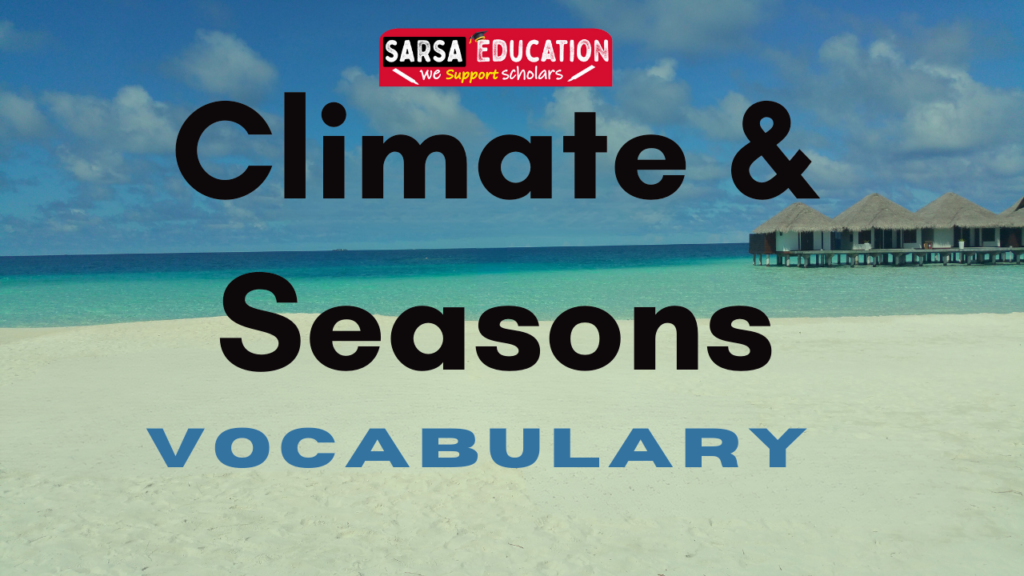Climate Vocabulary
Climate
Climate [klaɪmət] – The weather conditions prevailing in an area over a long period.
Weather [wɛðər] – The atmospheric conditions at a particular time, such as temperature, wind, and precipitation.
Climate Vocabulary
Tropical [trɒpɪkəl] – Relating to the tropics, characterized by warm temperatures.
Arid [ærɪd] – Extremely dry, lacking moisture (e.g., deserts).
Humid [hjuːmɪd] – Damp, moist, and warm, often associated with tropical climates.
Temperate [tɛmpərət] – Mild climate, not too hot or cold.
Polar [pəʊlər] – Relating to the North and South Poles, characterized by extreme cold.
Monsoon [mɒnˈsuːn] – A seasonal wind bringing heavy rains, especially in Asia.
Drought [draʊt] – A prolonged period of abnormally low rainfall.
Storm [stɔːrm] – A violent disturbance of the atmosphere with strong winds and usually rain, thunder, or snow.
Climate Vocabulary
Fog [fɒɡ] – A thick cloud of tiny water droplets suspended in the atmosphere near the ground, reducing visibility.
Climate Vocabulary
Hurricane [hɜːrɪkeɪn] – A large, powerful storm with strong winds and heavy rain, typically occurring in the Atlantic Ocean.
Blizzard [blɪzərd] – A severe snowstorm with strong winds and low visibility.
Typhoon [taɪˈfuːn] – A powerful tropical storm or hurricane occurring in the western Pacific or Indian Oceans.
Read also: Day 7: Festivals in India
Climate Vocabulary
Tornado [tɔːˈneɪdəʊ] – A rapidly rotating column of air that is in contact with both the Earth’s surface and a cumulonimbus cloud.
Thunder [θʌndər] – The sound caused by lightning during a storm.
Lightning [laɪtnɪŋ] – A flash of light caused by the discharge of electricity in the atmosphere during a storm.
Avalanche [ævəlæntʃ] – A large mass of snow, ice, and rocks falling rapidly down a mountainside.
Mild [maɪld] – Moderate in temperature or character, neither too hot nor too cold.
Chill [tʃɪl] – A slightly cold or cool temperature, but not freezing.
Season
Spring [sprɪŋ] – The season between winter and summer, characterized by warmer weather and blooming plants.
Summer [sʌmər] – The warmest season, typically associated with high temperatures and long days.
Autumn (Fall) [ɔːtəm/ or /fɔːl] – The season between summer and winter, when leaves fall and the weather cools.
Winter [wɪntər/] – The coldest season, characterized by short days and long nights.
Equinox [iːkwɪnɒks] – The time when day and night are of equal length, occurring twice a year in spring and autumn.
Solstice [sɒlstɪs/] – The time when the Sun reaches its highest or lowest point in the sky at noon, marking the beginning of summer or winter.
Frost [frɒst] – A thin layer of ice formed on surfaces when the temperature drops below freezing.
Heat wave [hiːtweɪv] – A prolonged period of excessively hot weather.
Snowfall [snəʊfɔːl] – The act of snow falling from the sky, especially during winter.
Thunderstorm [θʌndərstɔːrm] – A storm that includes thunder, lightning, and typically heavy rain or hail.
Foliage [fəʊliɪdʒ] – The leaves of plants or trees, especially during the autumn season when they change color.
Read also:Day 6: Family and friends
Climate Vocabulary
Equator [ɪˈkweɪtə] – The imaginary line around the middle of the Earth, dividing it into the Northern and Southern Hemispheres.
Frostbite [frɒstbaɪt] – Injury to body tissues caused by freezing, typically on fingers, toes, or the nose, during very cold weather.
Autumn Leaves [ɔːtəm liːvz] – The colorful leaves that fall from trees during the autumn season.
Harvest [hɑːvɪst] – The process of gathering ripe crops, often associated with autumn.
Solstice [sɒlstɪs] – The time of year when the sun reaches its highest or lowest point relative to the equator, marking the start of summer or winter.
Snowstorm [snəʊstɔːrm] – A snowstorm with heavy snowfall and possibly strong winds, causing poor visibility.
Climate Vocabulary
Dew [djuː] – Tiny drops of water that form on cool surfaces, like grass, during the night in the morning.
Blazing Heat [bleɪzɪŋ hiːt] – Extreme, intense heat, often experienced during summer.
Chilly Breeze [tʃɪli briːz] – A cold, refreshing wind often felt during early mornings or in the autumn season.
For regular English-Speaking Course updates, kindly join our Telegram channel
Follow the Sarsa Education channel on Telegram: https://shorturl.at/R5WKa

